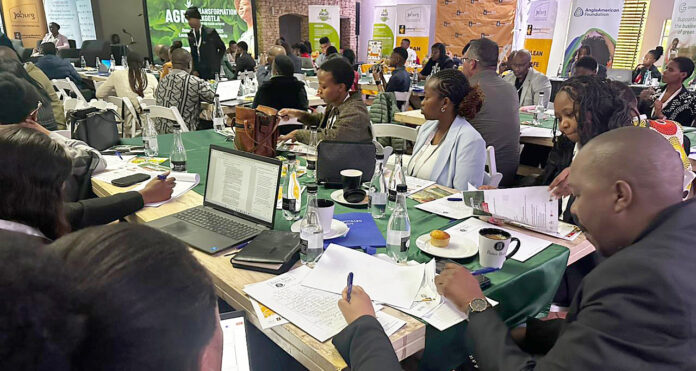South Africa must put “soul” into agricultural development and focus as much on building people as on securing land, the CEO of Kagiso Trust has said.
Mankodi Moitse was speaking at the 2025 Agricultural Transformation lekgotla, hosted by Food For Mzansi in Pretoria this week, where she opened with a stark reflection on inequality.
“Our country really has these First World and Third World features that are troubling,” she said, referencing aerial images of Mitchells Plain (Cape Town) and Avalon cemeteries (in Soweto). Even the graveyards do not have grass [on our side]. Can we put the soul in what we do, for the sake of what we are seeing in these pictures?”
She said the Kagiso Trust’s 40-year-old mission was to ensure that children from poor communities can “write their own narrative” and transition away from poverty.
“These kids hold so much hope for their families. A rural child must have the comfort that somebody will find me – no matter how inconvenient,” Moitse said.
She stressed that transformation in agriculture must centre on capable farmers with the right skills and leadership. “We believe we must grow the kind of farmer that we want to see – starting in primary schools and continuing through tertiary training,” she said.
Kagiso Trust’s updated farmer support model, shaped by farmer feedback, now includes climate-smart and urban agriculture, aggregation to strengthen markets, and differentiated support for farmers at different stages: those needing basic capacity building, those ready to grow, and those requiring market access.
“We thought that as long as we give finances, things will work out until farmers educated us,” Moitse admitted. “Programmes must talk to results. You can’t train farmers forever. Some are ready now.”
South Africa must strike a balance between safeguarding commercial agriculture and accelerating meaningful transformation, Mooketsa Ramasodi, director-general of agriculture, told the Lekgotla delegates.
Ramasodi called for an integrated land reform model that “not only develops black farmers who are already farming but also builds agriculture-related manufacturing, infrastructure, and skills”.
Referencing research by William Gumede, he said: “We must make sure that land reform is not just about transferring hectares but about creating productive, competitive enterprises.”
Despite ongoing challenges, Ramasodi remained optimistic about the sector’s performance. “We expect agriculture to grow by at least 3.5% this year, with more than half of our produce heading for export markets,” he noted, echoing forecasts by economist Johann Kotze. “This shows the strength of our sector, but it also shows how much more we could achieve if transformation is done right.”
He noted that agricultural transformation “cannot be [done by] government-led alone”.
The process, he said, required collaboration between the state, private sector, civil society, and international partners to develop and implement effective strategies.
“Our road map is clear,” Ramasodi said. “The Agriculture and Agro-processing Master Plan is the platform to get everyone moving in the same direction, with clear roles and shared accountability.”
Ramasodi concluded with a challenge to delegates: “Transformation is not a favour to anyone. It is an economic imperative. If we fail to make agriculture inclusive, we fail to secure its future.”



